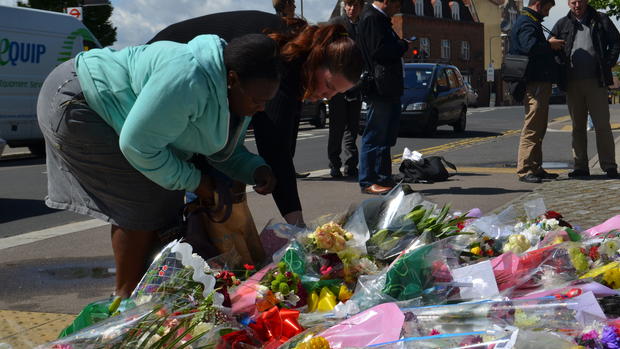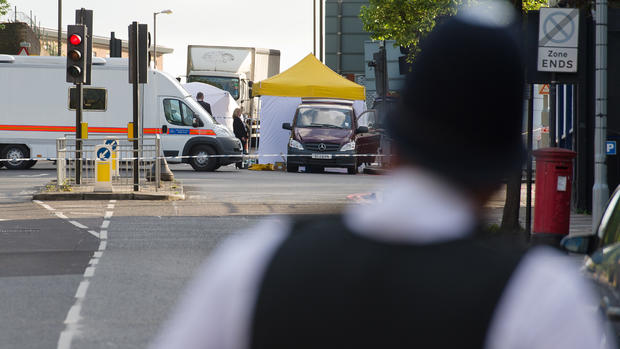One of the London attack suspects out of hospital
LONDON One of two suspects shot by police following the slaying of a British soldier in London last week has been released from the hospital and taken to a police station for questioning, police said Tuesday.
The release came as new details emerged about links between the other main suspect and a radical Islamic cleric in Kenya who had been sanctioned by the United States for being part of a terrorist network.
The case centers on the brazen killing of off-duty soldier Lee Rigby, 25, who was slain by two men wielding knives and meat cleavers near his barracks in southeast London's Woolwich area.
The two suspects were shot by police and arrested on suspicion of murder. Video showed two men rushing a police car that arrived on the scene moments before the shooting.
The younger suspect, 22-year-old Michael Adebowale, was judged well enough to be released from hospital and taken into police custody, where he was arrested on suspicion of the attempted murder of a police officer.
The other suspect, Michael Adebolajo, 28, remains in a hospital in stable condition under armed guard. He was seen on a separate video boasting about the killing minutes after the attack.
His family released a statement Tuesday expressing horror over what it called a "senseless killing." The family spoke of its "profound shame and distress" in a statement issued Tuesday, saying it has sent "heartfelt condolence" to Rigby's relatives.
In Kenya, police said they believed Adebolajo had earlier associated with a radical Kenyan Muslim cleric who tried to help him join an al Qaeda-linked rebel group in neighboring Somalia.
Muslim cleric Aboud Rogo Mohammed, who has since been killed, helped British citizen Adebolajo in his attempt to travel to Somalia to wage jihad, or holy war, against the country's United Nations-backed government, a senior Kenyan police official said Tuesday.
Adebolajo associated with Mohammed, who was suspected of steering young men to join Somalia's extremist rebels, said the Kenyan police official, who insisted on anonymity because he is not authorized to speak to the press on this matter.
- 10th suspect arrested in slaying of U.K. soldier
- U.K. soldier's family pays painful visit to murder scene
- New U.K. task force to tackle radical Muslim clerics
- Muslim hard-liners ID suspect in London attack
Adebolajo was arrested with five other young men in November 2010 near the Kenya-Somalia border and eventually returned to Britain, said police.
The radical Muslim preacher was shot dead in Mombasa, Kenya, in September 2012. Mohammed's supporters blamed the police for his killing and staged riots in which three security officials died in grenade attacks.
Mohammed had earlier been sanctioned by the U.S. Treasury Department for allegedly facilitating travel to Somalia for many young Kenyans wanting to join Somalia's al-Shabab rebels. The Treasury Department also charged that Mohammed was fundraising for al-Shabab.
A U.N. report also named Mohammed as steering young men to al-Shabab and described Mohamed as an extremist who advocated the violent overthrow of the Kenyan state.
Pate Island, part of the Lamu Archipelago at the Kenya coast, where Adebolajo was arrested in 2010, was one of the most commonly used routes for Islamic extremists trying to cross into Somalia to join al-Shabab, said the police official.
The al-Shabab camps have churned out dozens of bombers who have launched terrorist attacks in and outside Somalia. Al-Shabab controlled the Somali capital, Mogadishu, from roughly 2007 to 2011. The group still dominates most of south-central Somalia but has seen its territory reduced after military pushes by African Union and Somali forces.
The police official said Adebolajo was taken to a court in the port city of Mombasa, where police asked the court for time to investigate him on the allegations that he was attempting to fight with the militant group.
A video clip from a local TV station shows a man appearing to be Adebolajo speaking during a court hearing in Mombasa on Nov. 23, 2010. He says, "These people are mistreating us. We are innocent. Believe me," shortly before leaving the court with five other suspects.
The extensive revelations about Adebolajo's alleged attempts to link up with international terrorists have raised questions about whether Britain's intelligence services should have known he posed a risk.
Britain's parliamentary intelligence committee said Tuesday it will investigate whether U.K. intelligence services fell short before the killing of Rigby.
British officials say the two main suspects had been known to them for some time, and questions have swirled about whether authorities could have done more to prevent the killing.
Police have arrested 10 suspects — including the two shot and arrested immediately after the attack — in connection with Rigby's killing.
Rigby's slaying and the suggestion of suspects' links to radical Islam have fed a spike in anti-Muslim sentiment in Britain, with police and activists reporting a surge in hate crimes, violence and vandalism.
Meanwhile, Britain's counter-terrorism police are investigating an attack on two prison officers that took place Sunday evening, officials said. The incident involved a hostage situation that left two prison officers injured after a confrontation with Muslim prisoners.
Michael Spurr, chief executive of the National Offender Management Service, said in a statement that the incident started Sunday afternoon when a prison officer was taken hostage by three prisoners at the Full Sutton prison in Yorkshire.
A second officer tried to aid the hostage and was injured, receiving cuts in her arm, Spurr said.
The hostage was freed more than four hours later by "specially trained" prison staff.
Spurr said the hostage "suffered a broken cheekbone and a number of wounds to his face at neck" at the beginning of the incident. Both officers received hospital treatment for their injuries.
Officials said the three prisoners involved are Muslim. Two are aged 25 and one is 26.
Britain's parliamentary intelligence committee said Tuesday it will carry out a report into whether U.K. intelligence services fell short before Rigby's killing.
British officials say the two main suspects had been known to them for some time, and questions have swirled about whether authorities could have done more to prevent the killing.
Malcolm Rifkind, chair of Parliament's Intelligence and Security Committee, told the BBC on Tuesday that MI5 has pledged to cooperate as the committee tries to "get to the bottom" of the agency's work.

